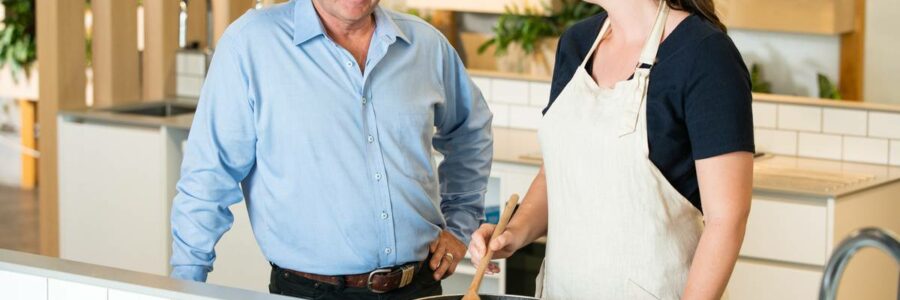
My Food Bag CEO Kevin Bowler on selling his shares, tomorrow’s sharemarket listing
Chief executive Kevin Bowler is confident that transitioning to a public entity is the right pathway forward for meal-kit company My Food Bag.
He said there had always been a dream among founders Cecilia and James Robinson and Theresa Gattung for the firm to become a public company that New Zealanders could invest in.
That dream is set to become a reality tomorrow when My Food Bag lists on both the NZX and ASX, following the sale of up to 185 million shares in the biggest IPO on these shores for some time.
My Food Bag will begin trading under the ticker MFB and will open with an initial market cap of just under $450 million.
The company’s shares were priced at $1.85 each with most of the $342m proceeds going to existing shareholders selling down their holdings. About $55m raised from new shares will be used to repay bank debt and fund the IPO costs.
“I think this is a great point in our history,” Bowler told the Herald on Wednesday.
The firm had been pondering a sharemarket float for around three years, but began working in earnest toward listing in mid-2020.
My Food Bag said the offer was oversubscribed with more applications for shares than those that were available meaning investors had their allocations scaled back.
Bowler expressed confidence in the $1.85 offer price.
Asked about skepticism about My Food Bag’s growth plans, Bowler said the company was focused on winning in the New Zealand market and not having its fingers in multiple overseas pies.
“We focus on quality growth. We’re consistently looking to grow the business by attracting customers that have a level of interest and commitment to the category we are in. That is quite a contrast to some of our global competitors who operate a much more aggressive acquisition-style approach.
“We’re proud of the approach we take – we’re focused on introducing people to the business who are interested in eating well, great food and exciting, inspiring recipes, and that results in more efficient spend in our marketing area and as a result of that a more profitable and sustainable business.”
Bowler sees the company’s future growth coming from New Zealand where he says there is “a ton of opportunity”: “We’re operating in this very large $37 billion grocery retail space and therefore we’ve got a heck of a lot of opportunities across different channels within the New Zealand market, and we’ve got a brand that New Zealanders know and relate to.
“If we were to go into an overseas jurisdiction we’d be building the brand again from scratch and I feel the opportunity is really strong here. We think that there is a lot of growth potential for us still in New Zealand for the foreseeable future.”
Ready-made meals are a big focus for My Food Bag, which is currently a small portion of the business.
This could be seen reflected in sales, with more Kiwis buying more frequently from the company, he said.
“We know if we’re careful and we think about expanding the business in ways that make sense for the customer then we’ve got tons of opportunity.”
Bowler, who was appointed chief executive in 2018, was issued 4.4 million new My Food Bag shares on February 10, converted from options, at an unknown price. He sold 75 per cent of those (3.3 million) through the IPO at $1.85 each.
He says the decision to sells those shares did not reflect a lack of confidence in the future performance of the business, but rather part of a tax obligation and drive for founding shareholders to sell down their shareholdings to make room for public investment.
Prior to listing, some senior executives participated in an executive share options scheme that allowed them to convert options to shares for a set price just ahead of the IPO. A loan was provided to the senior executives by the company to meet the set price payable for shares issued on exercise of the options.
The scheme, which has existed since 2016, will cease to exist upon My Food Bag listing.
“I will still be a significant shareholder in the business post-float as will the remainder of the founding shareholders and our private equity partners and management team. There’s a lot of confidence in the business.
“The management team had options which weren’t free so they had to be funded and there was a tax obligation which was required for each of the people converting their options into shares so that’s why there is an apparent reduction, but it was to fund the purchase price and the tax obligations.”
Bowler said he was open to acquiring more company shares in the future. He said he was “confident” in the prospective financial information released in the product disclosure document.
My Food Bag made a profit of $8.2m and had revenue of $153.3m in the past financial year.
The company forecasts revenue rising to $189.5m in 2021 and dipping slightly to $186.4m in 2022. The company expects net profit in 2021 of $800,000 to be adjusted on a pro forma basis to $15.6m and rising to $20.1m in 2022.
The company employs 200 staff and has packing facilities in Auckland and Christchurch.
Source: Read Full Article